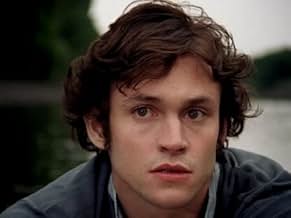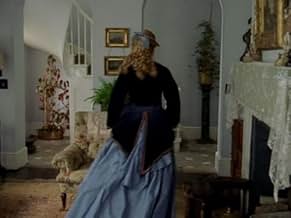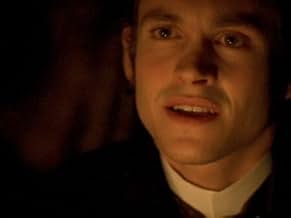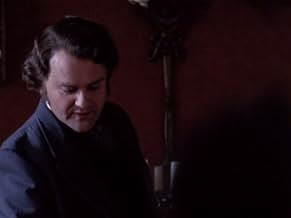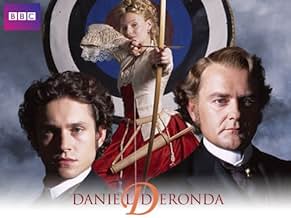Daniel Deronda
- Miniserie de TV
- 2002
- 53min
CALIFICACIÓN DE IMDb
7.2/10
5.3 k
TU CALIFICACIÓN
Gwendolen Harleth se siente atraída por Daniel Deronda, un desinteresado e inteligente caballero de parentesco desconocido, pero su propia necesidad desesperada de seguridad económica puede ... Leer todoGwendolen Harleth se siente atraída por Daniel Deronda, un desinteresado e inteligente caballero de parentesco desconocido, pero su propia necesidad desesperada de seguridad económica puede destruir su felicidad.Gwendolen Harleth se siente atraída por Daniel Deronda, un desinteresado e inteligente caballero de parentesco desconocido, pero su propia necesidad desesperada de seguridad económica puede destruir su felicidad.
- Ganó 3premios BAFTA
- 5 premios ganados y 4 nominaciones en total
Explorar episodios
Argumento
¿Sabías que…?
- TriviaThe novel is set in the early 1860s, whereas the adaptation moves the action ahead to 1874, the year that George Eliot began writing the novel.
- ErroresAt Ezra Cohen's store, the baby's left shoe and sock disappear then reappear.
- ConexionesFeatured in George Eliot: A Scandalous Life (2002)
Opinión destacada
The usual lush mini-series adapation from that reliable team, Andrew Davies and the BBC, of a literary property, this time George Eliot's almost forgotten last novel.
Daniel (Hugh Dancy) is the gorgeous if slightly wet boy of mysterious parentage adopted by wealthy amiable old buffer Sir Hugo (Edward Fox). He falls in love with the wrong woman, the beautiful but self-absorbed Gwendolen (Romola Garai). She however is propelled into marriage with ace bounder (and Sir Hugo's heir) Henleigh Grandcourt (Hugh Bonneville). Daniel then becomes interested in Mirah (Johdi May), a promising singer of Jewish background, and through her ailing brother Mordecai (Daniel Evans) the Zionist cause (yes, hotting up as far back as the 1870s). Grandcourt meets a bounder's fate and Gwendolen is now free to marry Daniel, but guess what ?
The costumes are great, the acting impeccable, the photography luminous but the story lacks punch. It is didactic rather than romantic, with metaphorical posters all over the place for women's rights and a homeland for the Jewish people. Hugh Dancy looks right for the part but Daniel is too much of a prig to be very likeable (though he has my sympathy when he discovers that Barbara Hershey, resplendent in a Venetian Palazzo is his mother Greta Scacchi would not have been so bad).
The most engaging characters are Grandcourt the bounder and his sidekick Lush (David Bamber Mr Collins in `Pride and Prejudice') and yet we are meant to despise them both. Gwendolen is sympathetic to the extent she marries Grandcourt to provide financial security for her mother and sisters, but she is a real dork otherwise. Generally the characters lack the panache of say, Trollope's characters in `The Way We Live Now', or Eliot's own in `Middlemarch'. Perhaps Ms Eliot should have quit while she was ahead.
The critics at the time (including Henry James) were baffled by the `Jewish' aspect of the story. It certainly was an outsider's view, yet it rings true today; here Ms Eliot was being prophetic, or was at least aware of the combination of repression, deprivation and myth that could give rise to a successful social movement. In 1876, the year the novel was published, it seemed most unlikely that Palestine would ever become a significant Jewish settlement. Daniel, desperate to find out about his background, finds a cause bigger than himself and eagerly throws himself into it. One has the feeling that Mirah, musically talented though she is, is going to be playing second fiddle.
Anyway, I enjoyed Hugh Bonneville's Grandcourt, a terrific bounder, and David Bamber's Lush (Mr Collins turns bad). And of course, this is Sunday evening stuff, so one mustn't be too picky about the crummy plot and the unsympathetic principals. I usually find myself at this point thinking `I must read the book' (if I haven't already), but this time I don't think I'll bother.
Daniel (Hugh Dancy) is the gorgeous if slightly wet boy of mysterious parentage adopted by wealthy amiable old buffer Sir Hugo (Edward Fox). He falls in love with the wrong woman, the beautiful but self-absorbed Gwendolen (Romola Garai). She however is propelled into marriage with ace bounder (and Sir Hugo's heir) Henleigh Grandcourt (Hugh Bonneville). Daniel then becomes interested in Mirah (Johdi May), a promising singer of Jewish background, and through her ailing brother Mordecai (Daniel Evans) the Zionist cause (yes, hotting up as far back as the 1870s). Grandcourt meets a bounder's fate and Gwendolen is now free to marry Daniel, but guess what ?
The costumes are great, the acting impeccable, the photography luminous but the story lacks punch. It is didactic rather than romantic, with metaphorical posters all over the place for women's rights and a homeland for the Jewish people. Hugh Dancy looks right for the part but Daniel is too much of a prig to be very likeable (though he has my sympathy when he discovers that Barbara Hershey, resplendent in a Venetian Palazzo is his mother Greta Scacchi would not have been so bad).
The most engaging characters are Grandcourt the bounder and his sidekick Lush (David Bamber Mr Collins in `Pride and Prejudice') and yet we are meant to despise them both. Gwendolen is sympathetic to the extent she marries Grandcourt to provide financial security for her mother and sisters, but she is a real dork otherwise. Generally the characters lack the panache of say, Trollope's characters in `The Way We Live Now', or Eliot's own in `Middlemarch'. Perhaps Ms Eliot should have quit while she was ahead.
The critics at the time (including Henry James) were baffled by the `Jewish' aspect of the story. It certainly was an outsider's view, yet it rings true today; here Ms Eliot was being prophetic, or was at least aware of the combination of repression, deprivation and myth that could give rise to a successful social movement. In 1876, the year the novel was published, it seemed most unlikely that Palestine would ever become a significant Jewish settlement. Daniel, desperate to find out about his background, finds a cause bigger than himself and eagerly throws himself into it. One has the feeling that Mirah, musically talented though she is, is going to be playing second fiddle.
Anyway, I enjoyed Hugh Bonneville's Grandcourt, a terrific bounder, and David Bamber's Lush (Mr Collins turns bad). And of course, this is Sunday evening stuff, so one mustn't be too picky about the crummy plot and the unsympathetic principals. I usually find myself at this point thinking `I must read the book' (if I haven't already), but this time I don't think I'll bother.
- Philby-3
- 6 jul 2003
- Enlace permanente
Selecciones populares
Inicia sesión para calificar y agrega a la lista de videos para obtener recomendaciones personalizadas
- How many seasons does Daniel Deronda have?Con tecnología de Alexa
Detalles
- Fecha de lanzamiento
- Países de origen
- Sitios oficiales
- Idioma
- También se conoce como
- 丹尼爾的半生緣
- Locaciones de filmación
- Edimburgo, Escocia, Reino Unido(Jewish market scenes)
- Productoras
- Ver más créditos de la compañía en IMDbPro
Contribuir a esta página
Sugiere una edición o agrega el contenido que falta

Principales brechas de datos
By what name was Daniel Deronda (2002) officially released in India in English?
Responda
